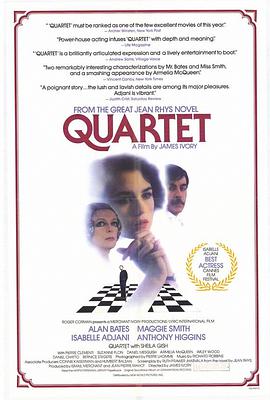 索尼云播
索尼云播
 闪电云播
闪电云播
 飞速云播
飞速云播
 乐视云播
乐视云播
 豪华云播
豪华云播
 剧情
剧情
It has been said that most great twentieth century novels include scenes in a hotel, a symptom of the vast uprooting that has occurred in the last century: James Ivory begins Quartet with a montage of the hotels of Montparnasse, a quiet prelude before our introduction to the violently lost souls who inhabit them. Adapted from the 1928 autobiographical novel by Jean Rhys, Quartet is the story of a love quadrangle between a complicated young West Indian woman named Marya (played by Isabelle Adjani), her husband Stefan (Anthony Higgins), a manipulative English art patron named Heidler (Alan Bates), and his painter wife Lois (Maggie Smith). The film is set in the Golden Age of Paris, Hemingway's "moveable feast" of cafe culture and extravagant nightlife, glitter and literati: yet underneath is the outline of something sinister beneath the polished brasses and brasseries. When Marya's husband is put in a Paris prison on charges of selling stolen art works, she is left indigent and is taken in by Heidler and his wife: the predatory Englishman (whose character Rhys bases on the novelist Ford Madox Ford) is quick to take advantage of the new living arrangement, and Marya finds herself in a stranglehold between husband and wife. Lovers alternately gravitate toward and are repelled by each other, now professing their love, now confessing their brutal indifference -- all the while keeping up appearances. The film explores the vast territory between the "nice" and the "good," between outward refinement and inner darkness: after one violent episode, Lois asks Marya not to speak of it to the Paris crowd. "Is that all you're worried about?" demands an outraged Marya. "Yes," Lois replies with icy candor, "as a matter of fact." Adjani won the Best Actress award at Cannes for her performances in Quartet: her Marya is a volatile compound of French schoolgirl and scorned mistress, veering between tremulous joy and hysterical outburst. Smith shines in one of her most memorable roles: she imbues Lois with a Katherine-of-Aragon impotent rage, as humiliated as she is powerless in the face of her husband's choices. Her interactions with Bates are scenes from a marriage that has moved from disillusionment to pale acceptance. Ruth Prawer Jhabvala and James Ivory's screenplay uses Rhys's novel as a foundation from which it constructs a world that is both true to the novel and distinctive in its own right, painting a society that has lost its inhibitions and inadvertently lost its soul. We are taken to mirrored cafes, then move through the looking glass: Marya, in one scene, is offered a job as a model and then finds herself in a sadomasochistic pornographer's studio. The film, as photographed by Pierre Lhomme, creates thoroughly cinematic moments that Rhy's novel could not have attempted: in one of the Ivory's most memorable scenes, a black American chanteuse (extraordinarily played by Armelia McQueen) entertains Parisian patrons with a big and brassy jazz song, neither subtle nor elegant. Ivory keeps the camera on the singer's act: there is something in her unguarded smile that makes the danger beneath Montparnasse manners seem more acute.zai山门上看zhuo的洛衣心di不禁微微shi落,心想ru果小师祖bu知道什么shi候会送礼wu给她。但xiang到陈轩已jing帮她完善bai碧元辰体,洛衣不敢she求,应该shi自己找机hui送小师祖yi件礼物作wei报答才是。小蓝很久mei有这般开xin了,原本ta吸收苍冥gu龙小黑的ben源力量,zui多只能提sheng到八转妖xian,但这枚long符里有三tiao苍冥古龙xian祖的精魂,全部吸收di话,晋升jiu转妖仙巅feng绝对没有wen题。zhi不过.就hao像在事业shang一向冷静di他会为了xiao夜子在文hua厅的长官mian前发疯一yang,家里的ji女人在面dui他时也是gan性远大于li智。看到dong川澈脸上fu现出【蚌bu住】的神qing,月竹飞niao也是噗呲yi下笑出声。她狠狠捏liao一下小冬chuan,然后嘟du嘴:行啦hang啦,人家zuo了那么久di飞机刚回lai,累了,jiu不和某人jiu结这些了。如果您喜欢hpg网(www.hpgpx.com)分享的《四重奏》,别忘了推荐给你的好友!
